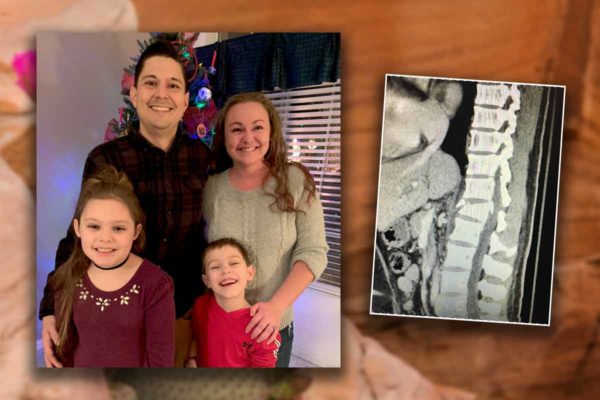|
Getting your Trinity Audio player ready...
|
Looking back, the most challenging days have made the present day that much sweeter.

“I didn’t think I’d be here,” said Brandon Gerber, administrative manager at GGRM. “If you saw me walking around, you wouldn’t know anything bad had happened to me.”
A severe injury on a construction site in 2016 left Brandon essentially paralyzed. He fell 19 feet and landed on his heels, breaking his right ankle and left hip. His right lung collapsed. But the worst of his injuries was a burst fracture in the L1 vertebrae.
“It exploded,” said Brandon, who underwent surgeries to place four screws and two rods in his spine. “I couldn’t move or feel my legs. I had pretty significant nerve damage from the belly button down, and they said I may not walk again.”
They didn’t know Brandon.
“I’ve never seen anybody so determined to figure out how to change his life,” said Lisa Anderson, workers’ compensation partner. “For someone who has had such a dramatic work injury that changed his entire life, he is truly the most upbeat and positive person I have ever met.”
It’s been a long road. Those first few weeks were dark. Brandon worried about his future and that of his young family.
“I thought, ‘My wife is going to have to take care of me for the rest of my life; I’ll never walk my daughter down the aisle, never play sports again with my son,'” said Brandon, who has called Las Vegas home since his Air Force father flew to town three decades ago.
During the first few months of residential rehabilitation, he couldn’t do much of what he had previously taken for granted.
“There were hard days where I didn’t want to do anything but take my pain meds and go to sleep, pretend it didn’t happen,” Brandon said. “But that doesn’t help anybody, particularly my wife.”
His wife’s commitment to his recovery and their family pushed him to get out of bed under his own power.
“My wife was basically a single parent for that first year,” Brandon said. “She did everything she could to help the kids and me and not let me see the strain. That was my motivating factor. I don’t want to be a burden to anybody. I wanted to get back whole, and to what I know I can do.”
Doctors were optimistic in his recovery as Brandon’s dedication caused significant improvement during the first few months of rehabilitation. The insurance company had worked reasonably well with the family at the beginning. Then it got contentious.
“They basically said to get over it,” Brandon said. “They were done and I could go home.”
After all his hard work and progress, the insurer was ready to stop assistance before he could regain most of his mobility.
“I had to walk again,” he said. “I needed help so I could focus on what I had to do to be where I am today.”
His mother suggested he call Toby Yurek, the managing partner at GGRM. Gerber prepared to stand with the GGRM team to battle the insurance company.
“It was not the experience I expected,” Brandon said. “You usually hear it’s a fight, but I didn’t see any of that. They took care of all of that. I was getting the care I needed so I could get better and go back to work.”
And he did. Just shy of a year after he was told he would be bedridden, Gerber began work as a safety manager for a steel company. There were limitations, but the job was written to be within his physical restrictions. That didn’t last long.
“I was getting nervous about getting injured again,” Gerber said. “I knew I couldn’t stay in that job. I had limits of what I could do in my industry.”
He reached out to Yurek for suggestions of local businesses where he could work with limited physical abilities. It was a hard call for Gerber, but he was relieved when Yurek returned with his reply: come to work at GGRM.
“He said, “I know what type of person you are,'” said Gerber, who was shocked at the offer to work at the law firm. “That is who they are. They get to know their clients. That meant a lot to me right then.”
The entry-level job required Gerber to start fresh in a new industry. He kept his head down and spirits up as he learned a new set of skills. His work ethic did not go unnoticed.
“He has an empathy for the workers’ compensation employees and for the clients because he has been both,” Anderson said. “He is the epitome of the can-do attitude.”
As a client, he felt as if he were the GGRM team’s primary concern, which he attempts to instill with those he works with.
“It makes me want to help people more,” Gerber said of his experience after his injury. “I want clients to know that they can get back to as close as you were to being whole again. You can do this, and there is help.”

